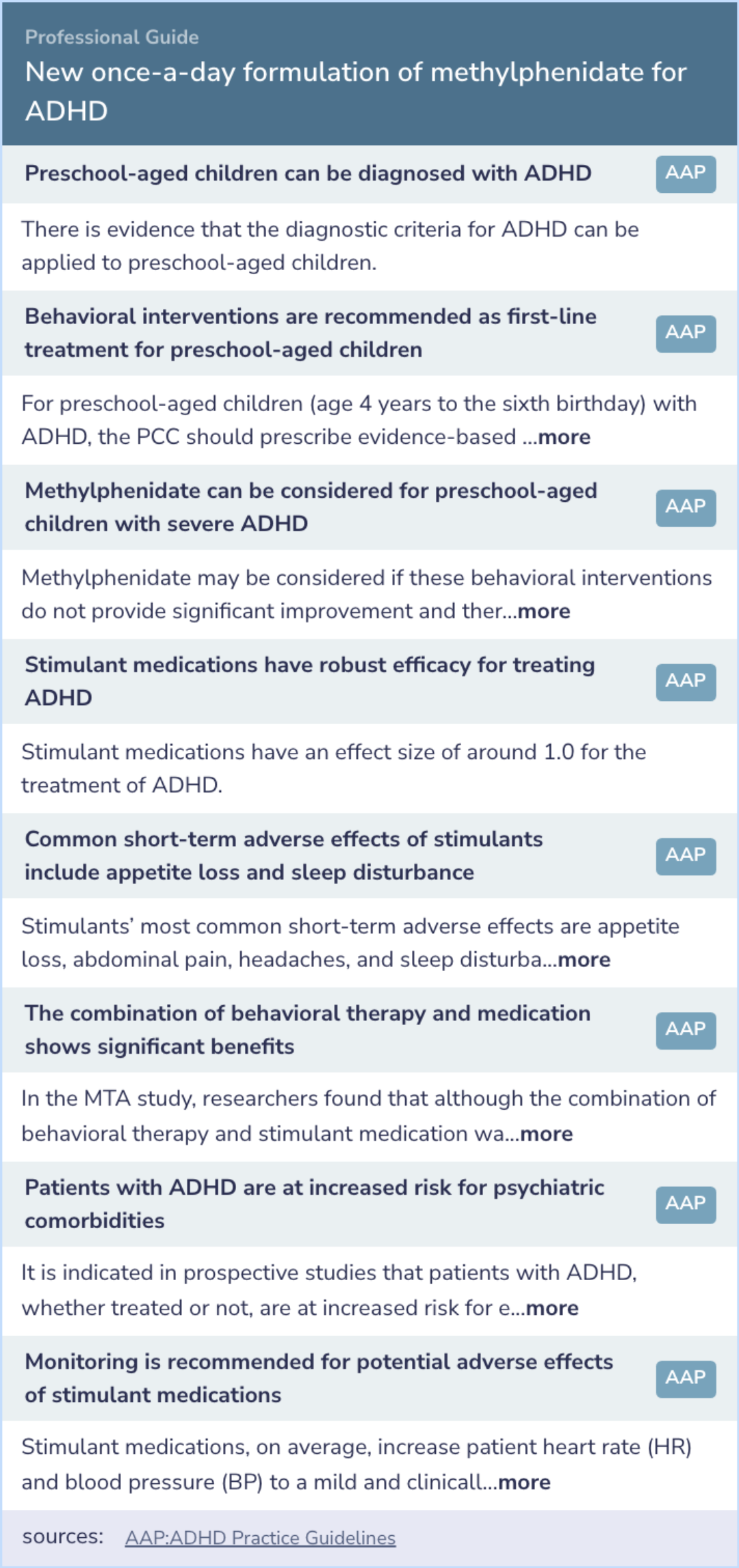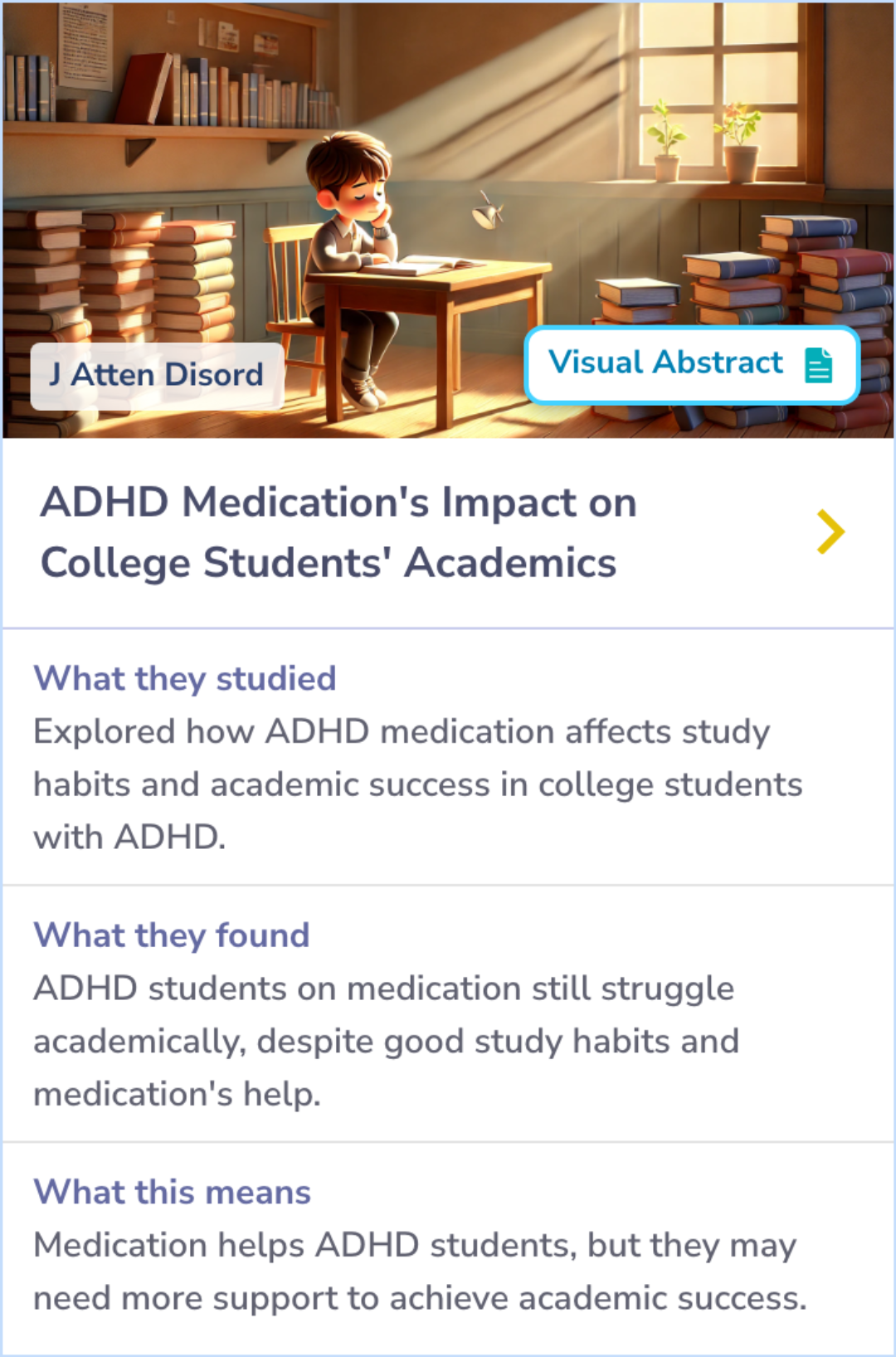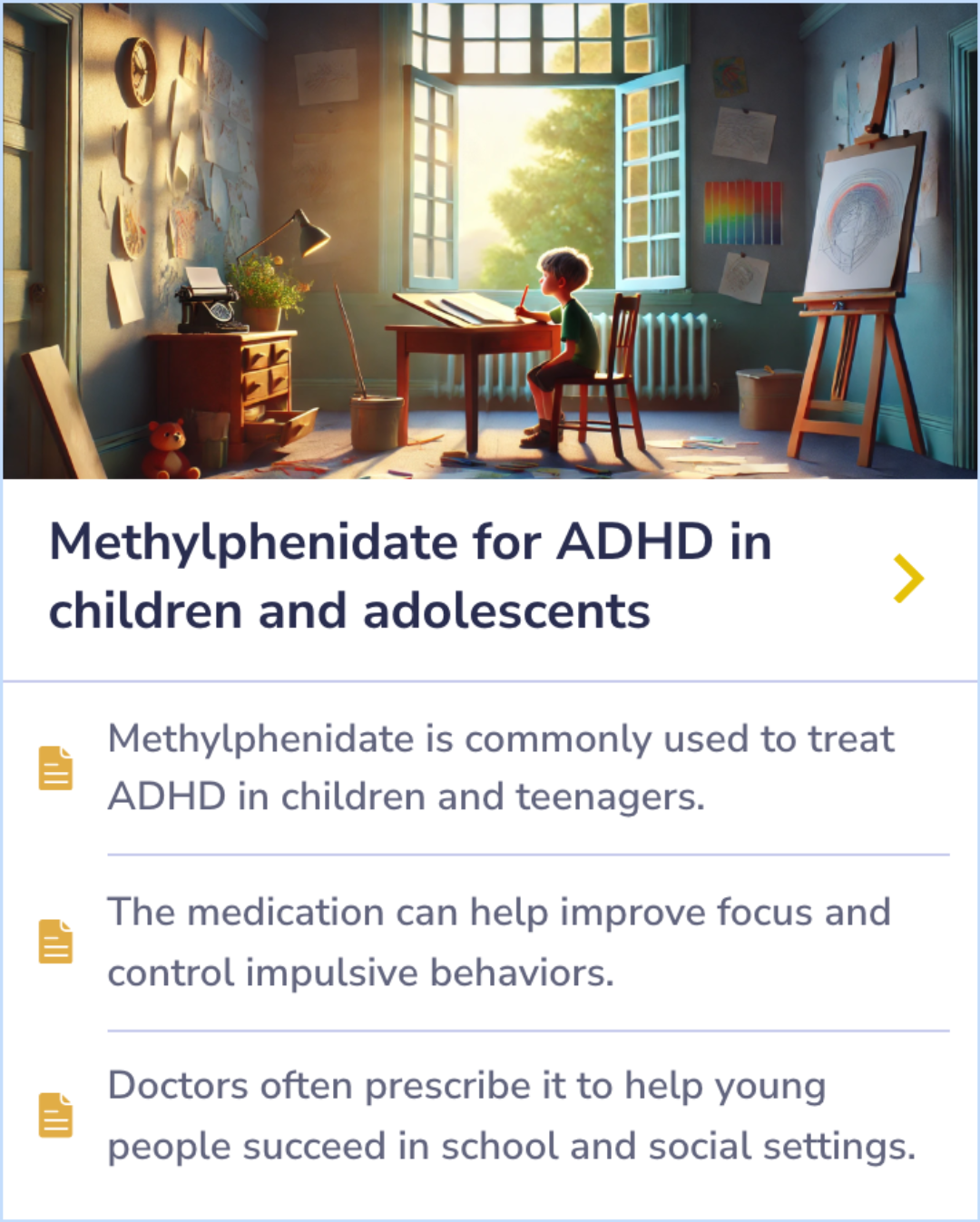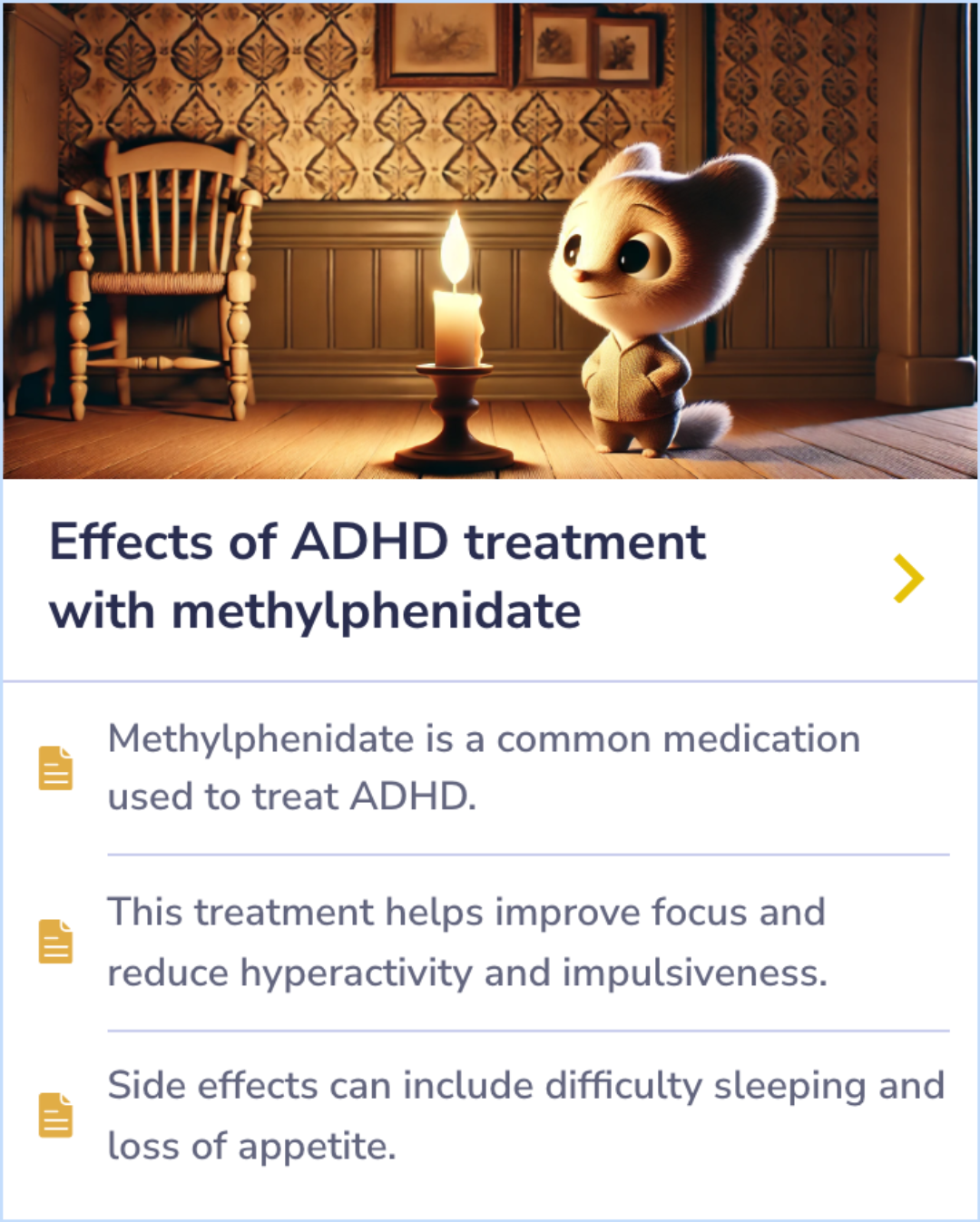Ritalin Paper Database
Visual Abstract
Development of a new once-a-day formulation of methylphenidate for the treatment of attention-deficit/hyperactivity disorder: proof-of-concept and proof-of-product studies
New once-a-day formulation of methylphenidate for ADHD
August 27, 2024
author
Swanson J, Gupta S, Lam A, Shoulson I, Lerner M, Modi N, Lindemulder E, Wigal S
journal
Arch Gen Psychiatry
Date Published
February 2003
Why link to a visual abstract?
What is a visual abstract?
Original
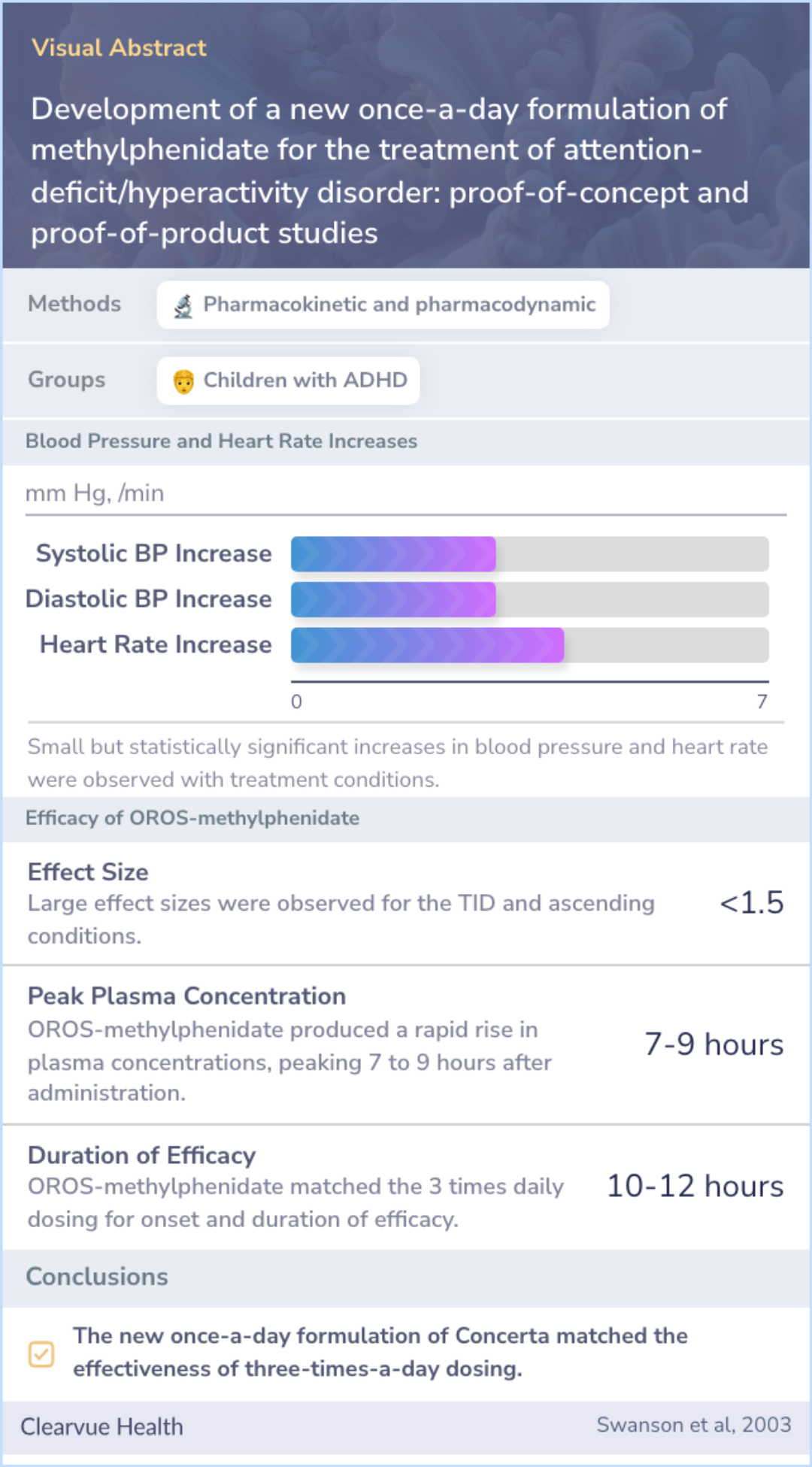
Study Summary
🔬
What They Studied
The researchers studied the effectiveness and duration of a new once-a-day formulation of methylphenidate (Concerta) compared to the traditional three-times daily dosing.
💡
What They Found
They found that the new formulation matched the traditional dosing in terms of onset and duration of efficacy, providing rapid onset within 1-2 hours and lasting 10-12 hours.
📚
What This Means
These findings align with the current evidence that methylphenidate (Ritalin) can effectively manage ADHD symptoms, showing that the new once-a-day formulation provides similar benefits to the traditional multiple daily doses.
Study Summary
Study Overview
Researchers explored if a new daily version of methylphenidate would be as effective as taking the medicine three times a day in children with ADHD.
They discovered that this new once-a-day formulation, known as Concerta, was just as effective in onset and duration as the traditional method.
These results indicate that Concerta could provide a more convenient treatment option while maintaining the same effects as multiple doses, supporting the trend toward sustained-release medications for ADHD.
They discovered that this new once-a-day formulation, known as Concerta, was just as effective in onset and duration as the traditional method.
These results indicate that Concerta could provide a more convenient treatment option while maintaining the same effects as multiple doses, supporting the trend toward sustained-release medications for ADHD.
Abstract: background
The duration of action of the immediate-release formulation of methylphenidate hydrochloride is short (3 to 4 hours), and 3 times daily dosing is thought to maximize effectiveness across a 12-hour day.

Translation of Science to Medicine
"These studies demonstrate the translation of a basic science finding (acute tolerance to clinical doses of methylphenidate) into clinical application (the selection of a new drug delivery pattern for methylphenidate)."
Design of New Treatment
"This work informed the design of traditional clinical trials, which followed and led to the approval by the Food and Drug Administration of OROS-methylphenidate (Concerta) for the treatment of ADHD."
Discovering Better Ways
"The selection of a new drug delivery pattern for methylphenidate produced a new product (OROS-methylphenidate or Concerta), which proved to have the predicted rapid onset and long duration of efficacy after a single administration in the morning."
Study Summary
Methods
Children with attention-deficit/hyperactivity disorder (ADHD) were studied in a lab school to understand the onset and duration of various methylphenidate treatments. An initial proof-of-concept study tested a unique dosing schedule where a starting dose was followed by gradually increasing doses every 30 minutes over 8 hours. Additionally, two studies were conducted using a new once-daily formulation, OROS-methylphenidate (also known as Concerta), which delivers the medication through an osmotic pump. These studies were focused on the drug's behavior in the body (pharmacokinetics) and its clinical effects (pharmacodynamics).
Abstract: methods
Children with attention-deficit/hyperactivity disorder were evaluated in a laboratory school to characterize onset and duration of the effect of a variety of methylphenidate regimens. In a proof-of-concept study, an experimental ascending profile was...more

Study Summary
Results
Results showed that the experimental dosing schedule produced effects similar to the standard three-times-daily regimen of immediate-release methylphenidate. In the pharmacokinetic study, OROS-methylphenidate led to a quick rise in drug levels in the blood, peaking between 7 to 9 hours after taking the dose. In the pharmacodynamic study, the effects of OROS-methylphenidate matched those of the three-times-daily dosing in terms of both onset and duration of action.
Abstract: results
The experimental ascending profile matched the effect of the standard regimen of methylphenidate, 3 times daily. In the pharmacokinetic study, OROS-methylphenidate treatment produced a rapid rise followed by increasing plasma concentrations that peak...more
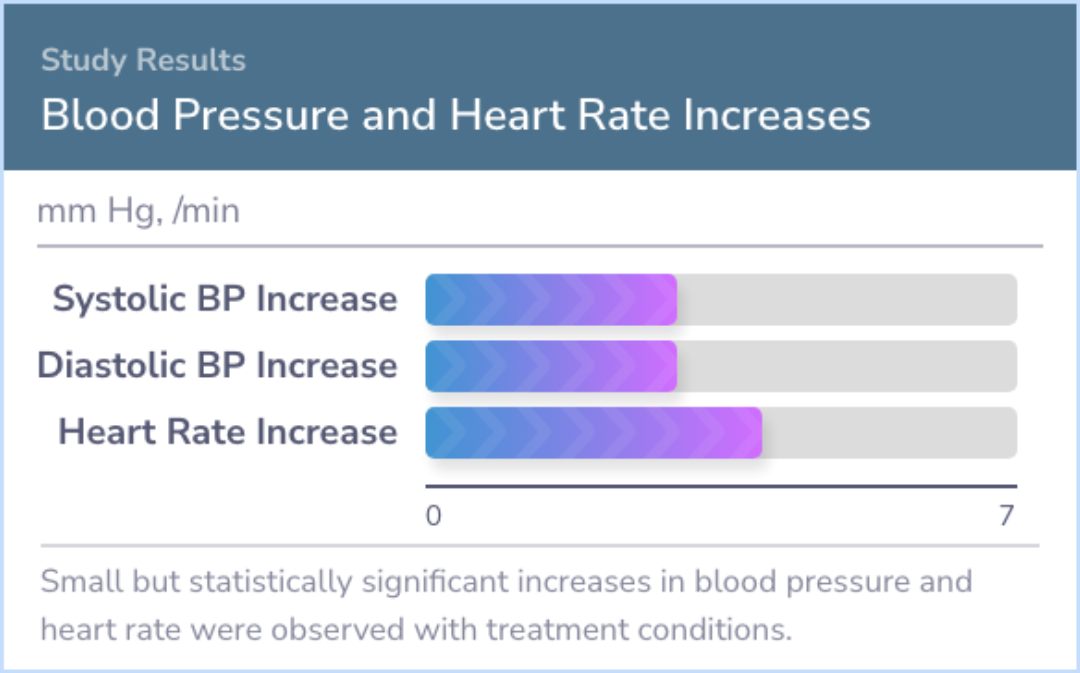
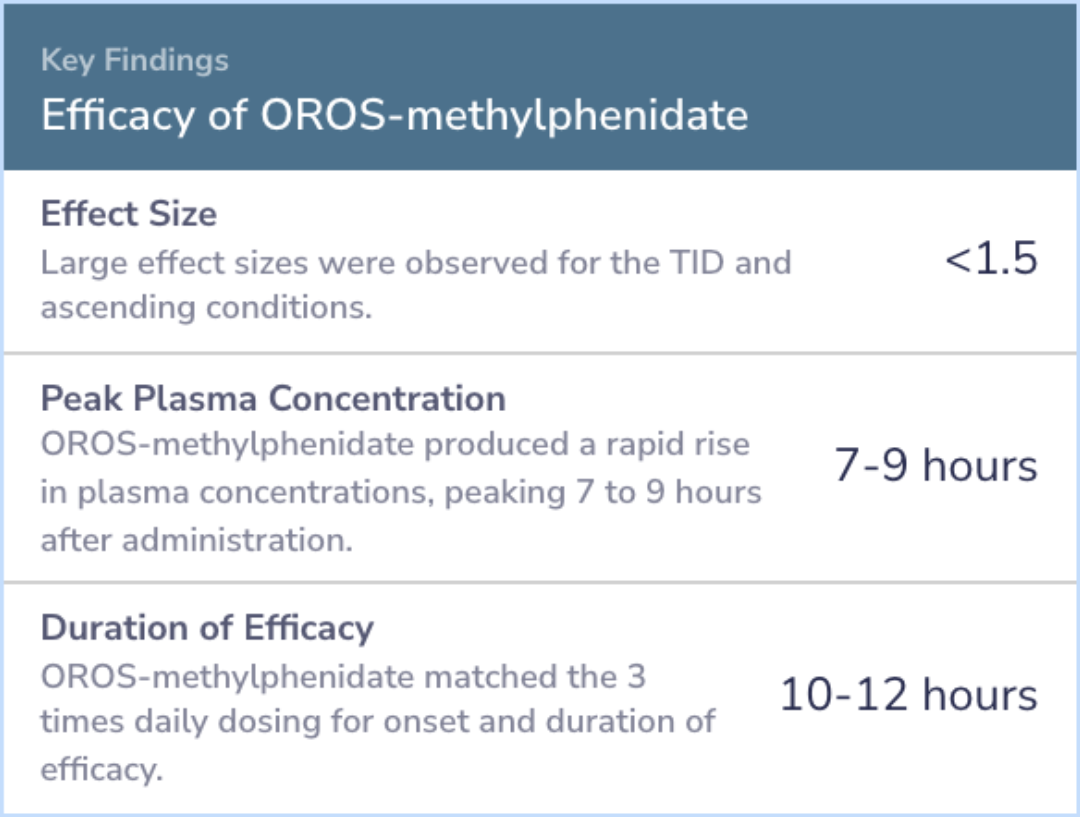
Study Summary
Conclusions
These studies successfully turned a scientific insight about acute tolerance to methylphenidate into a practical clinical application by creating a new drug delivery method. The resulting product, OROS-methylphenidate (Concerta), demonstrated both a rapid onset of action within 1-2 hours and a prolonged effect lasting 10-12 hours from just a single morning dose.
Abstract: conclusions
These studies demonstrate the translation of a basic science finding (acute tolerance to clinical doses of methylphenidate) into clinical application (the selection of a new drug delivery pattern for methylphenidate). This approach produced a new pro...more
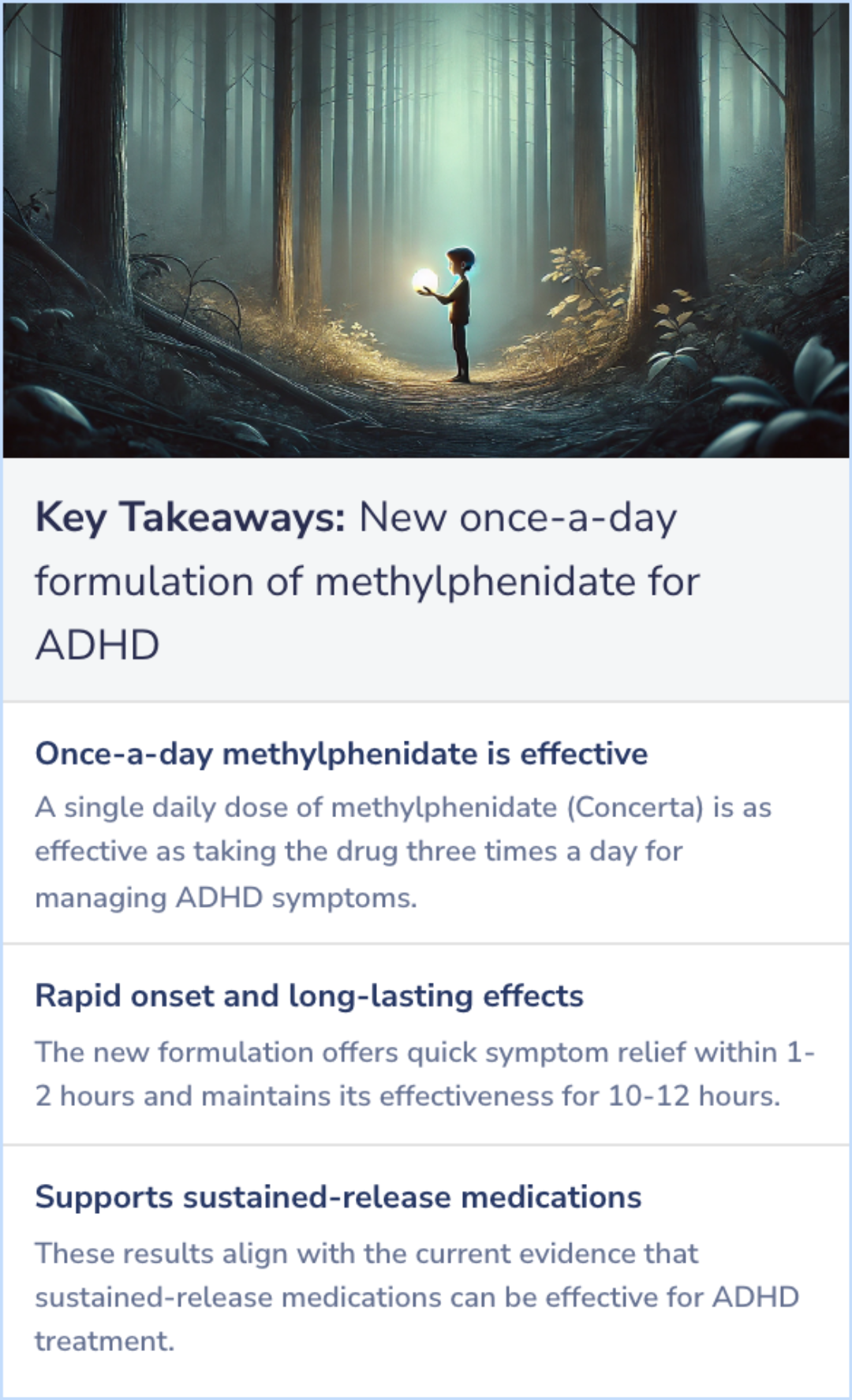
Background Information
Patient Guide
👨⚕️
Primary Use in ADHD Treatment
Methylphenidate is FDA-approved for treating ADHD in children and adults.
🧠
Action Mechanism
Blocks reuptake of norepinephrine and dopamine, increasing their concentration in the synaptic cleft.
👀
Monitoring for Side Effects
Regular monitoring for cardiovascular issues, psychiatric reactions, and growth suppression is required.
❤️
Risks in Cardiovascular Health
Can exacerbate symptoms like palpitations and is not recommended for those with serious heart conditions.
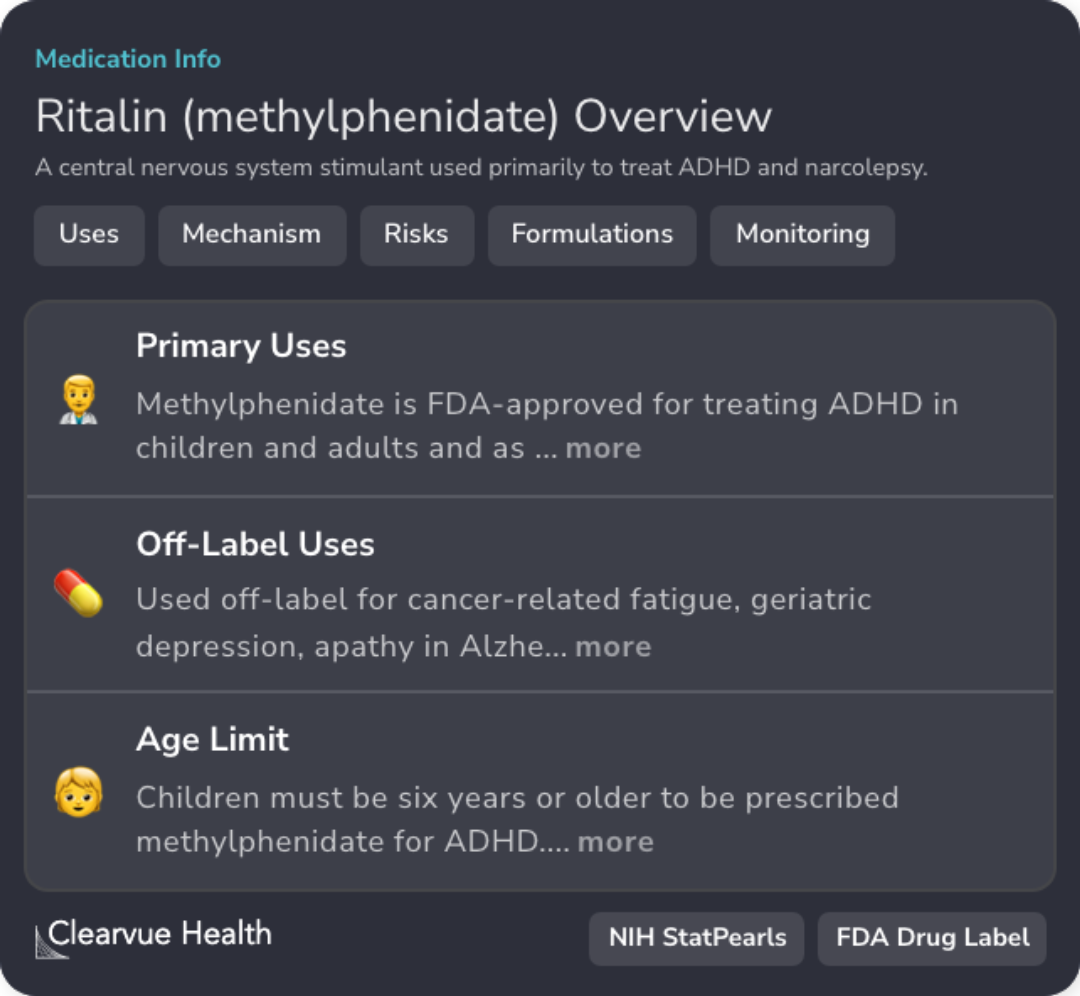
Professional Guide
Expert Opinion: New once-a-day formulation of methylphenidate for ADHD
In line with the findings on methylphenidate's efficacy and tailored delivery methods in the abstract, the importance of early and accurate diagnosis can't be overstated. Preschool-aged children can indeed be diagnosed with ADHD, using established criteria.
Given their young age, first-line treatment often involves evidence-based behavioral interventions, emphasizing the need for a holistic approach before medication.
However, if behavioral interventions fall short, methylphenidate remains a viable option for those with moderate-to-severe symptoms.
Stimulant medications show robust efficacy, with an impressive effect size for treating ADHD.
Yet, clinicians must remain vigilant for common short-term adverse effects like appetite loss and sleep disturbances, underscoring the need for monitoring vital signs during treatment.
Combining behavioral therapy with medication may provide additional benefits, particularly noted in secondary analyses of parent and teacher ratings of ADHD symptoms.
The increased risk for psychiatric comorbidities in ADHD patients highlights the necessity for comprehensive care strategies.
Given their young age, first-line treatment often involves evidence-based behavioral interventions, emphasizing the need for a holistic approach before medication.
However, if behavioral interventions fall short, methylphenidate remains a viable option for those with moderate-to-severe symptoms.
Stimulant medications show robust efficacy, with an impressive effect size for treating ADHD.
Yet, clinicians must remain vigilant for common short-term adverse effects like appetite loss and sleep disturbances, underscoring the need for monitoring vital signs during treatment.
Combining behavioral therapy with medication may provide additional benefits, particularly noted in secondary analyses of parent and teacher ratings of ADHD symptoms.
The increased risk for psychiatric comorbidities in ADHD patients highlights the necessity for comprehensive care strategies.
Evidence Summary
Academic Struggles of ADHD Students Despite Medication
ADHD-diagnosed undergraduates report that stimulant medications help but still struggle more than their peers. Their GPA, ACT scores, and class withdrawal rates are lower. Though most study habits are similar, preliminary data suggest that good habits alone might bridge the achievement gap. Stimulant meds, despite aiding focus, do not close the academic performance gap.
Evidence Summary
Methylphenidate's Role in ADHD Management
Methylphenidate is often prescribed for ADHD to help improve focus and reduce symptoms like hyperactivity and impulsiveness.
While effective, it can have side effects such as difficulty sleeping and loss of appetite.
This medication is a common choice for managing ADHD symptoms, offering clear benefits despite potential drawbacks.
While effective, it can have side effects such as difficulty sleeping and loss of appetite.
This medication is a common choice for managing ADHD symptoms, offering clear benefits despite potential drawbacks.
